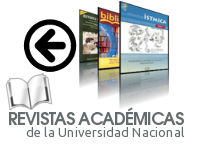Information For Authors
.png)
Tool to send your article
If you need the template for the shipment of your article enter the following instrument: Template for Siwô articles
Rules for authors
1. The article must be unpublished and original and must not be approved for publication in another journal. Siwö uses Turnitin Software for originality review. In case of plagiarism detection, the Editorial Team will take the measures established in the Code of Ethics.
2. If the article is a derivative of a previous research work, it is necessary to include this note in a footnote on page 1.
3. The article must be related to the journal's themes: theology and socio-religious studies, which can be approached from different disciplinary approaches.
4. The article must be sent together with a "declaration of originality", according to the format available on the journal's website, - section for authors - https://www.revistas.una.ac.cr/index.php/siwo
5. Each author's contact information must be indicated: full name, institutional affiliation, city and country, email, ORCID code. Please align the information to the right after the title (see recommended template). At the end of the article, after the “References” section, a brief biography of each author should be included (maximum 60 words).
6. The date of submission of the article must be indicated.
7. The article must be sent in Spanish, Portuguese or English.
8. The article must be presented in Times New Roman font, 12 points, space and a half. Its length must not be less than 15 pages or more than 30. The division of paragraphs must be indented.
9. The journal defines as a table the comparison between large amounts of information, both alphabetical and numerical, in vertical and horizontal tables (it must have a minimum of two horizontal columns and three vertical columns).
10. The magazine defines diagrams, timelines, photographs, images, among others.
11. Tables and figures must be mentioned in the text, have consecutive numbering and title. Below the table or figure, indicate the source and make adjustments as necessary. See recommended model.
12. Subtitles must be written in bold and according to the decimal system (eg 1., 1.1, 1.2).
13. Cursive (italic) letters should be used for emphasis or to write words in another language.
14. If the text includes Greek or Hebrew fonts, this must be properly indicated.
15. The title of the article must not exceed 15 words.
16. The article must include an abstract in Spanish, not exceeding 100 words, and its respective abstract in English and the abstract in Portuguese.
17. The keywords must be specified (maximum of five) in Spanish, and the respective keywords in English and keywords in Portuguese.
18. The article must clearly indicate: introduction, development of sections, conclusions and references.
19. Citations and references must follow the APA 7th edition format. See the section “Information for
authors, how to cite?”
20. If necessary, include an acknowledgment or funding paragraph at the end of the article: provideinformation about the entity that financed the research from which the article derives.
21. The article must be sent in word format.
22. Know the rights of the authors and the duties of the Editorial Team. See the Code of Ethics.
Statement of originality
Declaration of originality of the article in the language Español: Enter Here
Declaration of originality of the article in the language Inglés: Enter Here
Declaration of originality of the article in the language Portugués: Enter Here
Author identifier
If you wish to obtain your ORCID (Open Researcher and Contributor ID) code, you can register and fill in the requested data in the following link: Enter Here
Citations under APA Standards 7 edition
The APA (American Psychological Association) standards establish guidelines that allow you to organize and structure the information in a document, so it is recommended to inspect the following material on the APA standards 7th edition: Enter Here
Guide to the use of gender-inclusive language
Within the framework of the Costa Rican cultured speech, the Guide for the use of gender-inclusive language is available: Enter Here











